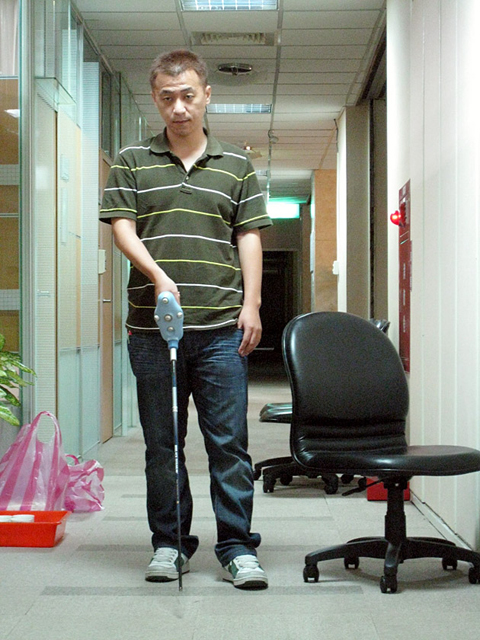A sophisticated electric walking cane for the blind is ready for mass production by this summer, the National Science Council (NSC) said yesterday, stressing the need for increased development and training for open source software (OSS) technologies.
The cane uses five supersonic sensors and advanced OSS that can drastically improve quality of life for the visually impaired, the council said.
“Though this is not the first electric cane on the market, it is the most sophisticated,” said developer Wang Wen-fong (王文楓), a National Yunlin University of Science and Technology computer science and information engineering professor.

PHOTO: LIN CHIA-CHI, TAIPEI TIMES
Wang said that guide dogs are difficult and expensive to train and hoped the invention could be a viable alternative.
“The cane’s supersonic sensors can detect road conditions up to 4m ahead of the user, distinguish between a dry road and one with puddles and even sense whether a tree branch is low enough to hit the user’s head,” he said.
The cane is part of the NSC’s OSS and embedded OSS development program, said Kuo Yau-hwang (郭耀煌), a National Cheng-kung University computer science and information engineering professor and leader of the program.
“Though Taiwan’s information and communication technology industry is a world leader in terms of hardware development, a gap exists in OSS development,” Kuo said.
As such, the NSC plans to allocate NT$100 million (US$3 million) in grants to sponsor tertiary institutional research projects for OSS training and development, he said.
OSS, as opposed to closed-source software, is software whose source code is open or at least partially open to the public, meaning users are free to use, modify or redistribute it without having to ask for permission.
“The popularity of Linux-based personal notebooks [such as Asus’ Eee PC] and cellphones — which use OSS, unlike Microsoft’s Windows — has in recent years allowed the development of OSS to blossom,” Kuo said.
As OSS is becoming the future of software, Kuo said that the country urgently needs to invest in it, adding that he felt the engine to drive domestic OSS development was the nation’s university students.
“In the past year, the NSC sponsored 99 OSS research teams in schools. Together, we have developed about 50 OSS programs, involving 407 doctorate and masters students,” he said.
Progress has also been made on the walking cane and other projects such as WiMax research, Kuo said.
“We plan to develop more OSS in intelligent terminals, broadband communications, telematics and multiple-core systems, so that our hardware has an increased competitive edge in the global market,” he said.

The manufacture of the remaining 28 M1A2T Abrams tanks Taiwan purchased from the US has recently been completed, and they are expected to be delivered within the next one to two months, a source said yesterday. The Ministry of National Defense is arranging cargo ships to transport the tanks to Taiwan as soon as possible, said the source, who is familiar with the matter. The estimated arrival time ranges from late this month to early next month, the source said. The 28 Abrams tanks make up the third and final batch of a total of 108 tanks, valued at about NT$40.5 billion

Travel agencies in Taiwan are working to secure alternative flights for travelers bound for New Zealand for the Lunar New Year holiday, as Air New Zealand workers are set to strike next week. The airline said that it has confirmed that the planned industrial action by its international wide-body cabin crew would go ahead on Thursday and Friday next week. While the Auckland-based carrier pledged to take reasonable measures to mitigate the impact of the workers’ strike, an Air New Zealand flight arriving at Taipei from Auckland on Thursday and another flight departing from Taipei for Auckland on Saturday would have to

A group from the Taiwanese Designers in Australia association yesterday represented Taiwan at the Midsumma Pride March in Melbourne. The march, held in the St. Kilda suburb, is the city’s largest LGBTQIA+ parade and the flagship event of the annual Midsumma Festival. It attracted more than 45,000 spectators who supported the 400 groups and 10,000 marchers that participated this year, the association said. Taiwanese Designers said they organized a team to march for Taiwan this year, joining politicians, government agencies, professionals and community organizations in showing support for LGBTQIA+ people and diverse communities. As the first country in Asia to legalize same-sex

MOTIVES QUESTIONED The PLA considers Xi’s policies toward Taiwan to be driven by personal considerations rather than military assessment, the Epoch Times reports Chinese President Xi Jinping’s (習近平) latest purge of the Chinese People’s Liberation Army (PLA) leadership might have been prompted by the military’s opposition to plans of invading Taiwan, the Epoch Times said. The Chinese military opposes waging war against Taiwan by a large consensus, putting it at odds with Xi’s vision, the Falun Gong-affiliated daily said in a report on Thursday, citing anonymous sources with insight into the PLA’s inner workings. The opposition is not the opinion of a few generals, but a widely shared view among the PLA cadre, the Epoch Times cited them as saying. “Chinese forces know full well that